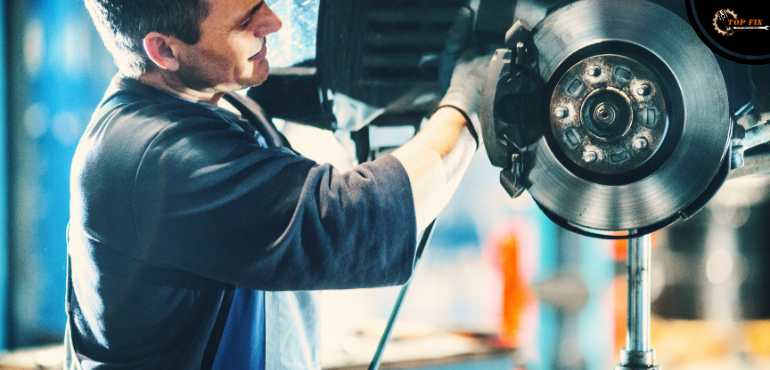Car brake bleeding is crucial for keeping your brake system responsive and reliable. At Top Fix Auto Repair in Dubai, we offer professional car brake bleeding services to eliminate air bubbles in your brake lines. This boosts brake responsiveness and ensures maximum stopping power when you need it most.

Whether your pedal feels spongy or your brake warning light just turned on, our expert technicians are ready to restore your braking confidence with precision bleeding techniques and top-grade tools.
Catching the signs early helps you avoid bigger issues down the road. Here’s when your brakes likely need bleeding:
Soft or Spongy Pedal:
A mushy pedal feel is one of the most common signs of air in the brake lines.
Inconsistent Braking:
If braking feels unpredictable or weak, air may be disrupting pressure in the system.
After Fluid Change:
Any time brake fluid is replaced, bleeding ensures no air remains trapped in the lines.
Brake Warning Light:
A dashboard light can indicate a deeper issue with brake hydraulics or air contamination.
Certified Brake Specialists:
Our team knows the ins and outs of brake systems across all car makes and models.
Modern Diagnostic Tools:
We use state-of-the-art tools to perform accurate bleeding and fluid top-ups.
Fast, Hassle-Free Service:
Quick turnaround with zero compromise on quality—so you’re safely back on the road in no time.
Affordable Pricing:
Top-tier service at pocket-friendly rates because safety shouldn’t break the bank.
We follow a proven, step-by-step process for maximum safety and results:
Brake System Inspection:
We start by examining your full brake system to identify air bubbles, leaks, or fluid issues.
Brake Bleeding:
Using advanced bleeding equipment, we flush out trapped air and restore consistent pressure.
Brake Fluid Check & Top-Up:
We assess the condition and level of your brake fluid and top it up with the recommended type if needed.
Test Drive:
After bleeding, we perform a road test to ensure the brakes are sharp, smooth, and fully responsive.
Q1: What is brake bleeding, and why is it important?
It’s the process of removing air from the brake lines to ensure consistent pressure and responsive braking.
Q2: How often should I get my brakes bled?
Typically every 2 years or as recommended by your car’s manufacturer—especially if the pedal feels soft.
Q3: What are the signs that my car needs brake bleeding?
Spongy pedal, longer stopping distances, inconsistent braking, or a warning light.
Q4: How long does brake bleeding take?
Usually about 30–60 minutes, depending on your vehicle type.
Q5: Is brake bleeding included in other brake services?
Often included with full brake system flushes or major brake component replacements.